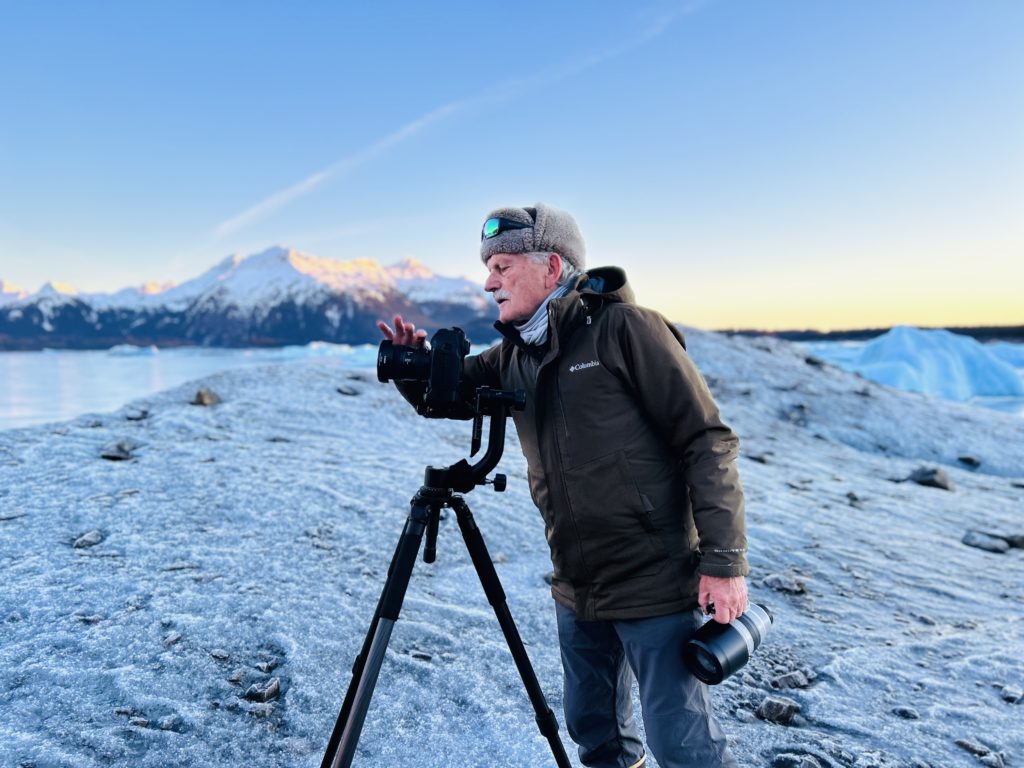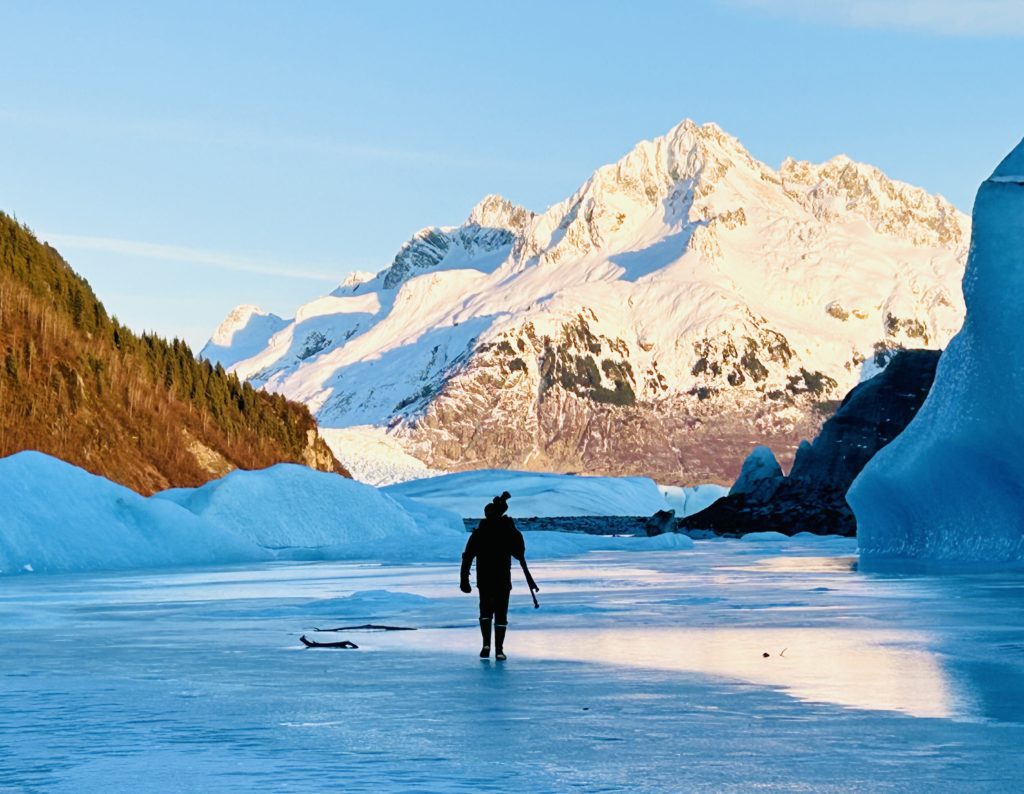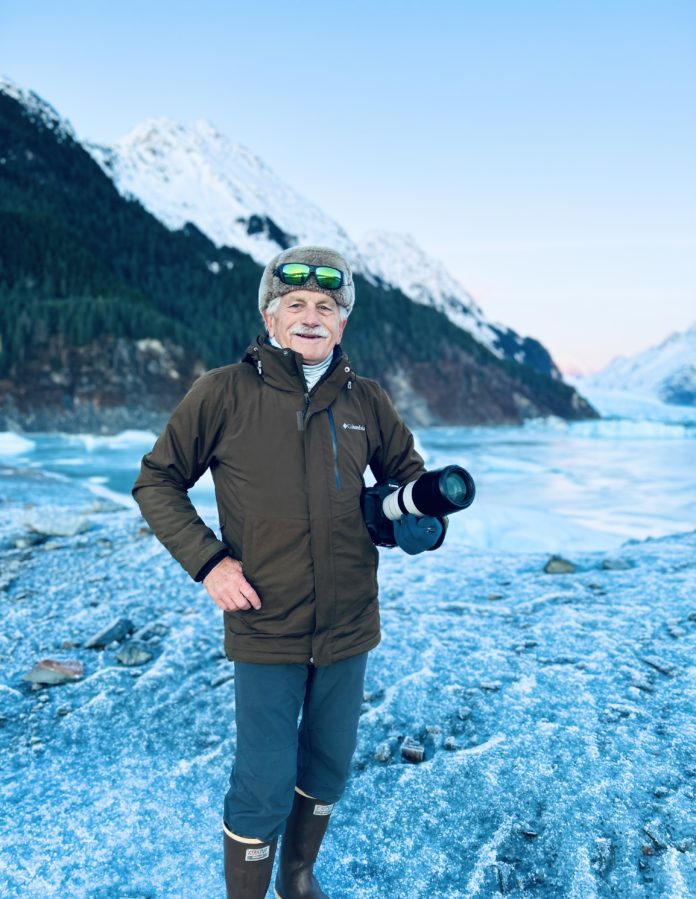A life driven by purpose and meaning is a life well lived.
That’s the essence of Rick Joseph Rosenthal, the renaissance man and award-winning director and marine biologist, who visited Cordova recently for a visual media scout trip.
Rosenthal, who has a taste for adventure and a love for nature and animals that is palpable, shared how he possesses so much great energy. He simply stated that he “keeps going.” His drive comes from the thrill of capturing the great shot, being outside and seeing new things.

“Seeing something new motivates me,” Rosenthal said. “And it’s not just in the ocean. What we are doing out here, watching eagles and watching little dippers along the stream, that is what life is all about.”
While in Cordova, he captured videography of silver salmon and the surrounding landscape for a new documentary he is working on, tentatively titled “Salmon in Ice.” Led by local guide and naturalist Robert Masolini, Rosenthal discovered some incredible things he is thrilled to hopefully share with the world.
He also did some local talks, one at Prince William Sound Science Center and one at the North Star Theatre, where he played a documentary he directed called “Whale Wisdom,” which was produced by his wife Katya Shirokow’s company Wild Logic. After the film Rosenthal also led a question-and-answer style discussion, where lots of curious Cordovans chimed in.
One question in particular caught everyone’s attention: What’s the most remarkable thing you’ve ever seen?

“We filmed the first white whale, a baby sperm whale in the Azores, and that just blew us away,” he said. “The baby was with a family and came over to our boat and started to tow our little boat with a towing rope. That was a game changer.”
The narrator of the documentary “Whale Wisdom,” Sir David Attenborough, is a dear friend of 25 years to Rick. The quintessential voice to many nature films, Attenborough is unmatched in the field and still does narrations, Rosenthal said.
“You can take it to the bank — he is not just a voice,” Rosenthal said. “He is a great man, he’s got the know-how, the heart, he’s super smart, and he’s 96 years old. Isn’t that amazing? He has seen it all, and has a great sense of humor.”
Rosenthal was born in Ohio but grew up in San Diego, where his family had an avocado ranch and quarter horses. Their home was a short 20-minute drive away from the ocean, a place he would spend a lot of his adult life studying marine mammals.
“I learned to free dive, I was out in the ocean with my little spear, searching for halibut and corbina, I got hooked on free diving then,” said Rosenthal.
His family, including his brothers, uncle, and father, were outstanding swimmers.
Rosenthal went off to Oregon State University on a baseball scholarship. When he got back to California, he shared he had an epiphany about his career trajectory while attending college and working at SeaWorld.
“The trigger was I went back down to Palomar College in San Diego County, played sports there, and got a job at SeaWorld, before they even opened,” he said. “I worked as a trainer, cleaning tanks. Back then, SeaWorld was very small, and everyone wanted to work there. It was in an ocean area. It was cool, and I got to be around pretty sea maids. It lit my fire to get into marine biology.”
Rosenthal received his undergraduate degree in Zoology at Humboldt State University, where he started the school’s dive program. He learned valuable life lessons and certified over 100 people during his time there. He went on to work at Westinghouse Ocean Research Labs in San Diego, where he had access to research submarines.
“I was diving a lot and doing some of the first environmental baseline studies on the west coast of North America. We had transect lines off shore in the kelp forest, and studying the animals there,” said Rosenthal.
He then got into the Scripps Institute of Oceanography, one of the premiere oceanographic facilities in the world, where he worked as staff of marine ecology. He finished his master’s degree at San Diego State University and post graduate classes at Scripps.
Rosenthal’s travels have taken him all over the world, a few of which brought him to Alaska — he actually lived in Cordova for three years in the mid 1970s. The expeditions included everything from studying transplanted sea otters off southeast Alaska and working in Kachemak Bay to doing independent studies for the Alaska Department of Fish and Game and NOAA.
He said Danger Island, in Prince William Sound off the coast of Seward, is one of his favorite areas.
“That place was remarkable 30-40 years ago,” Rosenthal said. “We would see lots of critters there, a lot of circulation and ocean currents, it’s a dramatic spot.”
He also talked about his voyages to the Aleutian Islands, exploring historical grounds.
“We went out to Kiska, where the major battle was taking place in (World War II) with the Japanese,” he said. “We went there in the wintertime on a king crab boat out of Dutch Harbor. We were the first people to dive on the wrecks out there.”
The film Rosenthal is currently shooting highlights both Pacific and Atlantic species of salmon, different life cycles, and how climate change is affecting their journey, survival and adaptation patterns. Other on-location shoots for the film include Greenland.
Rosenthal has been involved in and directed a plethora of wildlife documentaries that have been broadcast on BBC, Amazon Prime, PBS, National Geographic and Discovery.
“Rarely does anybody film salmon in salmon streams in the winter,” the filmmaker said. “It’s all done in the spring and summer, a little easier to work, but that doesn’t tell the story. I wanted to look at the salmon stream with a camera in winter, let it get cold and snowy.”
And salmon in Alaska, he said, needs to be documented.
“Salmon is really the keystone species here that’s providing the calories, nutrients for everything from the trees to a lot of life that lives along the freshwater systems,” Rosenthal said. “That’s how important the salmon is. If the salmon goes, those systems will probably collapse.”
For more information on Rosenthal and his body of work, visit https://www.rickrosenthal.net/about/.






